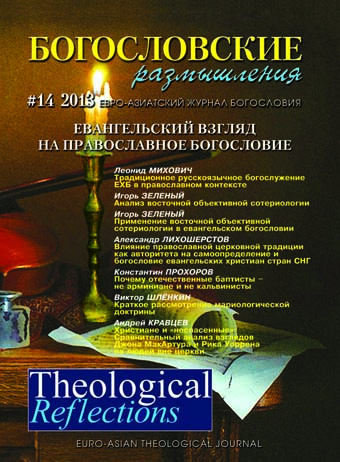An Application of Eastern Objective Soteriology in Evangelical Theology
DOI:
https://doi.org/10.29357/issn.2521-179X.2013.14.91Keywords:
Ecclesiology, Orthodox soteriology, OrthodoxyAbstract
This article examines the possibility of applying the objective soteriology inherent to the Christian East since the second century in evangelical theology. An attempt is made to define the difference between the juridical and ontological approaches to the work of Christ; an analysis of the arguments of the Eastern vision is carried out; a balanced soteriological understanding based on the organic approach is presented. It is noted that our understanding of salvation should be based on the Eastern approach, since this approach gives a deeper ontological explanation of the work of Christ. The article presents conclusions from the Eastern view which, in the writer’s opinion, can be used in evangelical theology. They apply to anthropology, the concept of sin, soteriology, and ecclesiology. The article confirms that it is precisely organic soteriology that supplies Protestant theology with arguments that allow evangelical believers to justify their right to be called the true church of Christ. The article would be useful to readers interested in the early period of Eastern theology and in contemporary Orthodox soteriology.References
- Without bibliography
Downloads
How to Cite
Issue
Section
License
Copyright (c) 2020 Igor ZELENY

This work is licensed under a Creative Commons Attribution-NonCommercial 4.0 International License.
All articles published in the Journal are distributed under a Creative Commons Attribution-NonCommercial 4.0 International License
By submitting an article for publication in Theological Reflections: Eastern European Journal of Theology the author grants the editors the right to publish the article and distribute it in electronic and print form.
The author reserves all copyrights and the right to use the materials of the article in whole or in part for educational purposes, to write his own dissertations, to prepare abstracts, conference reports, oral presentations, etc., as well as post electronic copies of articles (including the final electronic version downloaded from the journal’s official website) on non-commercial web-resources without the consent of the editorial board and founders.



